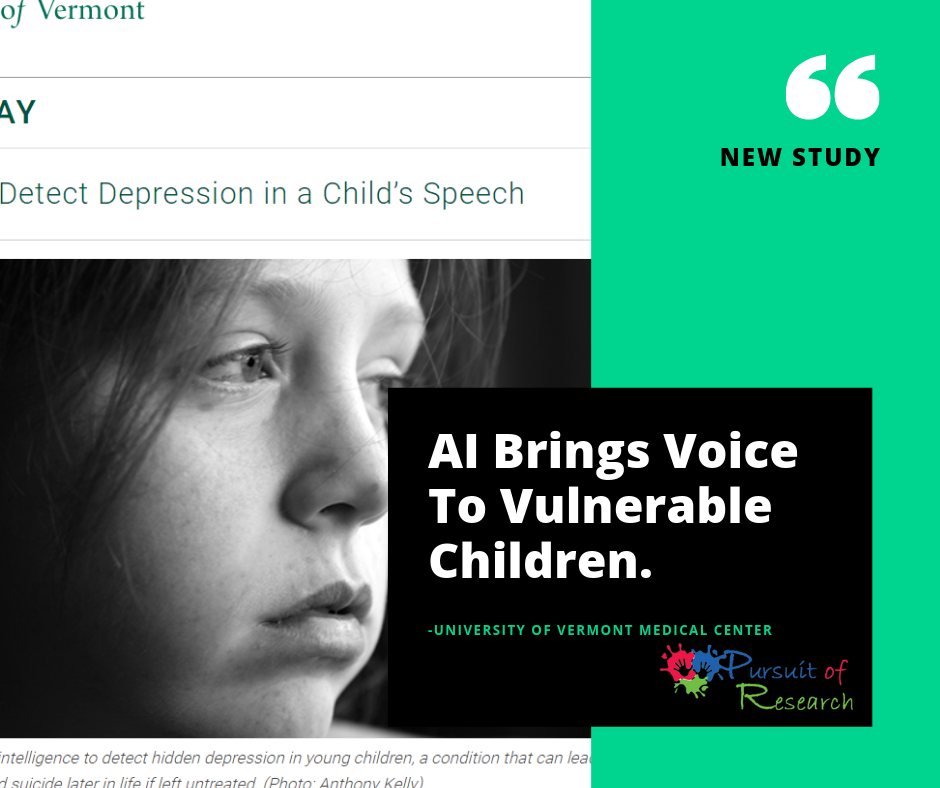
For children on the neurological spectrum, there is a 28 time higher risk than that of typical children for suicidal thoughts or attempts. Depression was the strongest single predictor of suicide contemplation or attempts in children with autism.
Penn State College of Medicine researchers
New Study Finds AI Can Detect Hidden Depression in a Child’s Speech With 80% Accuracy
Researchers from the University of Vermont Medical Center have found that by using Artificial Intelligence (AI) they can detect hidden depression in a young child’s speech with 80% accuracy. Depression is a condition that can lead to increased risk of substance abuse and suicide later in life if left untreated. “We need quick, objective tests to catch kids when they are suffering,” says Ellen McGinnis, a clinical psychologist at the University of Vermont Medical Center’s Vermont Center for Children, Youth and Families and lead author of the study.

Cherab Foundation 100% Bully Free crowdFunnit Project
It is well documented that depression can be triggered early on by social issues, lack of friends, lack of compassion and acceptance, and why through the Cherab Foundation, we are exploring ways to bring our Bully Free project nationwide through the schools. This project implements the proactive and evidence-based circle of friends which complements and enhances any ongoing bully prevention programs already in place.

There are numerous reasons why this is needed today more than ever.
Research Has Found Children On The Neurological Spectrum Have a 28X Higher Risk Of Suicidal Thoughts or Attempts
Few appear to appreciate that while suicide is sadly the 2nd leading cause of death in teens and young adults, according to Penn State College of Medicine researchers for those with autism, there is a 28 time higher risk than that of typical children for suicidal thoughts or attempts. 77% of autistic children that were depressed had suicidal thoughts or attempts. 77% you may ask? Direct quote from the researchers: “Depression was the strongest single predictor of suicide contemplation or attempts in children with autism. Seventy-seven percent of children with autism who were considered by their parents to be depressed had suicide contemplation or attempts.”
Special Needs Students At 2 to 3X Increased Risk of Bullying In Comparison To Typical Students
Due to the lack of funding and awareness about other communication impairments on the neurological spectrum such as apraxia, we don’t know what the rates are for depression and suicidal thoughts and attempts in comparison to that of typical children. However, in spite of the lack of specific research to other conditions on the neurological spectrum, in general students with disabilities are much more likely to be bullied than their nondisabled peers. For example:
- A study published in the British Journal of Learning Support found 60 percent of students with disabilities report being bullied regularly compared with 25 percent of all students.
- In the study Disabilities: Insights from Across Fields and Around the World, children with disabilities were two to three times more likely to be bullied than their nondisabled peers.
- A study published in the Journal of Developmental and Behavioral Pediatrics found children with special health care needs at a higher risk for bullying, victimization, and ostracism in comparison to children with no special needs. For those with autism or ADHD in particular, they found “clinically significant bullying.”
- A 2019 study published in the British Journal of Special Education found that “Children with special educational needs often feel lonely in classrooms, are less accepted by their classmates and have fewer friendships.”
Video from PACER about special needs and bullying recited by 5 students with special needs who are all bullied due to a silent disability such as autism, apraxia or ADHD.
Study: Giving Voice to Vulnerable Children: Machine Learning Analysis of Speech Detects Anxiety and Depression in Early Childhood.
Abstract of this study just published in the Journal of Biomedical and Health Informatics:
Childhood anxiety and depression often go undiagnosed. If left untreated these conditions, collectively known as internalizing disorders, are associated with long-term negative outcomes including substance abuse and increased risk for suicide. This paper presents a new approach for identifying young children with internalizing disorders using a 3-minute speech task. We show that machine learning analysis of audio data from the task can be used to identify children with an internalizing disorder with 80% accuracy (54% sensitivity, 93% specificity). The speech features most discriminative of internalizing disorder are analyzed in detail, showing that affected children exhibit especially low-pitch voices, with repeatable speech inflections and content, and high-pitched response to surprising stimuli relative to controls. This new tool is shown to outperform clinical thresholds on parent-reported child symptoms, which identify children with an internalizing disorder with lower accuracy (67-77 vs. 80%), and similar specificity (85-100 vs. 93%), and sensitivity (0-58 vs. 54%) in this sample. These results point toward the future use of this approach for screening children for internalizing disorders so that interventions can be deployed when they have the highest chance for long-term success.Quote from the lead author of the study:
“Around one in five children suffer from anxiety and depression, collectively known as “internalizing disorders.” But because children under the age of eight can’t reliably articulate their emotional suffering, adults need to be able to infer their mental state and recognize potential mental health problems. Waiting lists for appointments with psychologists, insurance issues, and failure to recognize the symptoms by parents all contribute to children missing out on vital treatment.
“We need quick, objective tests to catch kids when they are suffering,” says Ellen McGinnis, a clinical psychologist at the University of Vermont Medical Center’s Vermont Center for Children, Youth and Families and lead author of the study. “The majority of kids under eight are undiagnosed.”
Early diagnosis is critical because children respond well to treatment while their brains are still developing, but if they are left untreated they are at greater risk of substance abuse and suicide later in life. “
Journal Reference:
Ellen W. McGinnis, Steven P. Anderau, Jessica Hruschak, Reed D. Gurchiek, Nestor L. Lopez-Duran, Kate Fitzgerald, Katherine L. Rosenblum, Maria Muzik, Ryan McGinnis.
Giving Voice to Vulnerable Children: Machine Learning Analysis of Speech Detects Anxiety and Depression in Early Childhood.
IEEE Journal of Biomedical and Health Informatics, 2019; 1
DOI: 10.1109/JBHI.2019.2913590
Ellen McGinnis, lead author, and clinical psychologist at the University of Vermont Medical Center’s Vermont Center for Children, Youth and Families
A good question would be how much speech would a child require for the AI to detect depression since according to another Penn State study, 64% of those diagnosed with autism have co-existing apraxia.
I hope there are future studies specifically on communication impaired students, not limited to just autism, and bullying since there has been a rise in children who are unable to communicate verbally. (thankfully AI is on the way to help on this front too!) Curious if the AI is picking up something in the nuances of the way a child is speaking and not as much the words or amount of words.
Animated video created from student drawings and writing nationwide, brought to life with the voices of youth. It poignantly provides insight into how painful bullying can feel, but also touchingly shows that kids want it to stop and want to be part of the solution.
LISA GENG
Author, Mom, Founder, and President of The Cherab Foundation
Lisa Geng is an accomplished author, mother, founder, and president of the CHERAB Foundation. She is a patented inventor and creator in the fashion, toy, and film industries. After the early diagnosis of her two young children with severe apraxia, hypotonia, sensory processing disorder, ADHD, and CAPD, she dedicated her life to nonprofit work and pilot studies. Lisa is the co-author of the highly acclaimed book “The Late Talker” (St Martin’s Press 2003). She has hosted numerous conferences, including one overseen by a medical director from the NIH for her protocol using fish oils as a therapeutic intervention. Lisa currently holds four patents and patents pending on a nutritional composition. She is a co-author of a study that used her proprietary nutritional composition published in a National Institute of Health-based, peer-reviewed medical journal.
Additionally, Lisa has been serving as an AAN Immunization Panel parent advocate since 2015 and is a member of CUE through Cochrane US. Currently working on her second book, “The Late Talker Grows Up,” she also serves as an executive producer of “Late Talkers Silent Voices.” Lisa Geng lives on the Treasure Coast of Florida.